Life
These Insect Bite Remedies Will Get Rid Of That Swelling ASAP

If there's anything that the recent heatwave has taught me, it's to cover yourself in insect repellent. Unfortunately, it has taken the experience of several inflamed and itchy bug bites to make me realise that. Now I'm stuck with numerous red lesions, the only thing to do is figure out how to make them quickly disappear. And I'm sure I'm not the only one. So if you're also wondering how to get rid of insect bites, here are five tried and tested methods that may help.
As the NHS states, the majority of insect bites and stings will disappear on their own within a few days, if not hours. But it is possible for some people to experience a mild allergic reaction in the form of a larger patch of swollen, red, or painful skin. This can take around a week to go down. (Serious allergic reactions are less common, but any signs of dizziness, breathing problems, or a swollen face or mouth should be immediately treated by a medical professional.)
Before trying any of the following remedies, the NHS advises washing any affected areas with a simple combination of soap and water. And, of course, try not to scratch.
1Ice
When skin is inflamed, the first thing to turn to is a cold compress. Avoid putting ice directly onto the skin, notes Medical News Today. Instead, wrap an ice pack in a cloth or towel, or soak a flannel in cold water and apply to any swollen area for a minimum of 10 minutes.
2Antihistamine
When an insect bites you, it releases an irritant which triggers the immune system to release histamine, explains Dr. Sheila Wijayasinghe for The Globe and Mail. This then causes "an inflammatory reaction," leading to swelling and eventual itching.
An antihistamine helps stop histamine from doing its job, lessening the symptoms. These usually come in a tablet or cream form. A pharmacist can advise you which one to take.
3Tea Bag
Although the NHS doesn't advise using home remedies like vinegar or bicarbonate of soda, one that is dermatologist-approved is a good old-fashioned tea bag. Dr. Schultz also told Women's Health that a cool tea bag can help swelling and itching.
"Cool" means making your usual cup of tea, leaving the tea bag to cool for a few minutes, and sticking it on top of your bite.
4Essential Oil
A variety of essential oils have been proven to reduce the symptoms of insect bites. Tea tree oil can help with itchiness, swelling, and pain, dermatologist Dr. Neal Schultz told Women's Health. It may also prevent an infection.
Lavender oil is also a good choice for itchiness, reports Healthline, while a 2011 study found chamomile oil to be more effective than one percent hydrocortisone cream at healing skin lesions. It is also recommended to "relieve itching and inflammation."
Aside from lavender oil, you shouldn't apply any essential oil directly to the skin. To avoid a burning or stinging sensation, fill a spray bottle with water. Mix a couple of drops of the oil with an equal amount of a diluting one, such as vegetable oil, per ounce of water. Shake the mixture and spray onto the affected area.
5Hydrocortisone Cream
Hydrocortisone products contain corticosteroids, states the NHS, that treat symptoms of numerous skin problems, including eczema, prickly heat, and, of course, insect bites. Most formulas are mild and can be bought from a pharmacy.
It's likely you'll only need to use the cream for a few days for a bite, but be aware that you should delay putting on any other skin product for around 10 minutes after hydrocortisone application.
6
The above remedies are all well and good, but the best insect bite strategy is to prevent them in the first place. To do that, the NHS recommends wearing an insect repellent that contains 50 percent DEET.
This article was originally published on